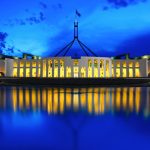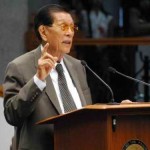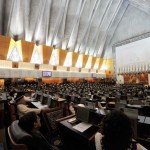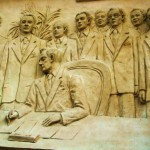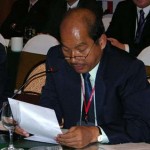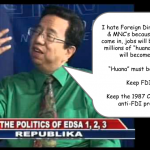Chapter I – The National Assembly
Article 50. Legislative power shall be vested in a unicameral National Assembly, except to the extent as otherwise provided in Articles 76 and 77 of this Constitution.
Article 51. The National Assembly shall be composed of as many members as may be provided by law, three-fourths of whom shall be District Representatives elected from legislative districts apportioned among the provinces, cities, and the Metropolitan Manila area in accordance with the number of their respective inhabitants, and on the basis of a uniform and progressive ratio, and one-fourth of whom shall be Party-list Representatives, who shall be chosen by the political parties on the basis of proportional representation according to the votes each party obtained in the preceding elections.
Each legislative district shall comprise, as far as practicable, contiguous, compact and adjacent territory. Each legislative district and each city with a population of at least two hundred thousand, and each province, shall have at least one District Representative.
Within three years following the return of every census, which shall be conducted at least once every ten years, the National Assembly shall pass a law to reapportion the legislative districts based on the standards provided in this article.
Article 52. Voters shall cast one vote for their candidate in the legislative district and another vote for the political party of their choice. No names of candidates shall appear on the party-list portion of the ballot, but shall instead indicate a brief official statement of the principles and proposed policies and program of government of the different political parties.
In legislative districts where only one candidate qualified for the election, the latter must receive the approval of the majority of the entire votes cast in an approval system of voting for the same to be declared duly elected, otherwise a failure of election must be declared. In legislative districts where two candidates qualified for the election, the candidate who received the highest number of votes must be declared duly elected, and in case of tie, a failure of election must be declared. In legislative districts where three or more candidates qualified for the election, the candidate who received the majority of the entire votes cast in a preferential or alternative system of voting must be declared duly elected, otherwise a failure of election must be declared. In case of a failure of election, an extraordinary election must be called to fill such vacancy in the manner prescribed by law.
The seats in the National Assembly that are reserved to Party-list Representatives shall be allocated to political parties proportionally to the number of votes each party received in the party-list portion of the ballot. The quota of votes required to win a seat shall be determined by the formula: (V / (S + 1)) + 1, where V = total number of valid party-list votes, and S = total number of seats to be filled. To allocate seats, the number of valid party-list votes for each party shall be divided by the quota, resulting in an integer and a fractional remainder; each party shall first be allocated a number of seats equal to the integer; parties shall then be ranked on the basis of the fractional remainders, and the parties with the largest remainders shall each be allocated an additional seat until all the seats have been allocated.
Only a political party that receives at least two per centum of the total valid party votes cast shall be entitled to the share in the distribution of party-list seats. However, a party that receives fewer votes shall still be entitled to keep any legislative district seats that it wins. No cap or ceiling shall be set on the allocation of seats to any single party, nor shall the allocation of seats be limited to any particular type of party.
Party-list Representatives shall be proclaimed by the Commission on Elections based on their ranking in the list submitted by the respective parties in accordance with Article 165, provided that any candidate, who has been duly elected in a legislative district, shall be crossed off the list and replaced with the next candidate down.
Members of the National Assembly shall represent the entire Nation, and not only the voters who elected them. They shall not receive any imperative mandate from their voters.
Article 53. No person shall be a member of the National Assembly unless he is a citizen of the Philippines, is a member of an accredited political party, is a member of no clergy or similar religious dignitary as forbidden by Article 6, and, on the day of the election, is at least twenty-five years of age, and, except Party-list Representatives, a registered voter in the district in which he shall be elected, and a resident thereof for a period of not less than one year immediately preceding the day of election.
Article 54. The office of Representatives shall be for a term of five years, which shall begin, unless otherwise provided by law, at noon on the thirtieth day of June next following their election.
Unless otherwise provided by law, the ordinary election of the members of the National Assembly shall be held on the second Monday of May and every four years thereafter.
In case the National Assembly is dissolved, the President of the Republic shall call an extraordinary election on the date set by the President of the Council of Government to be held not earlier than forty-five days nor later than sixty days from the date of the dissolution of the National Assembly. In the new National Assembly, the members shall serve for a term of four years beginning from the time the President of the Council of Government convokes the National Assembly, which shall not be later than twenty days immediately following the elections.
In case any vacancy arises among the District Representatives, an extraordinary election may be called to fill such vacancy in the manner prescribed by law, but the Representative thus elected shall serve only for the unexpired term.
In case of vacancy in seats reserved for Party-list Representatives, the party concerned shall automatically fill the vacancy with the next Representative on their list submitted under Article 165, who shall serve for the unexpired term. If the list is exhausted, the party concerned shall submit additional candidates to the list.
Article 55. The National Assembly shall convene once every year on the fourth Monday of July for its ordinary session, unless a different date is fixed by law, and shall continue to be in session for such number of days as it may determine until thirty days before the opening of its next regular session, exclusive of Saturdays, Sundays, and legal holidays. It may recess for periods not exceeding thirty days each, and not more than ninety days during the year. The Permanent Commission may call an extraordinary session at any time.
Article 56. In its first session, the National Assembly shall elect its President by a majority vote of all its members from among themselves. It shall choose such other officers as it may deem necessary. The President of the Assembly, once elected, shall preside over sessions of the National Assembly and shall continue in office at the pleasure of the National Assembly, but until such election has been made the National Assembly shall be presided by the Father of the Assembly, who is the oldest and longest-serving member of the National Assembly. The election of the President of the Council of Government shall precede all other business following the election of the President of the National Assembly.
At least one-third of the members of the National Assembly shall constitute a quorum to do business, but a smaller number may adjourn from day to day and may compel the attendance of absent members in a manner, and under such penalties, as the National Assembly may provide. Provided, however, that at least a majority of the members of the National Assembly shall constitute a quorum for voting.
The National Assembly may determine the rules of its proceedings, punish its members for disorderly behavior, and with the concurrence of two-thirds of all its members, suspend or expel a member. A penalty of suspension, when imposed, shall not exceed sixty days.
The National Assembly shall keep and publish a Journal of its proceedings, excepting such parts as may, in its judgment, affect national security; and the yeas and nays on any question shall, at the request of one-fifth of the members present, be entered in the Journal.
Article 57. The salaries of the President of the National Assembly and its members shall be determined by law. No increase in compensation shall take effect until after the expiration of the full term of all its members approving such increase.
Article 58. All members of the National Assembly shall, upon assumption of office, make a full disclosure of their financial and business interests. They shall strictly avoid conflict of interest in the conduct of their office. They shall notify the National Assembly of a potential conflict of interest that may arise from the filing of a proposed legislation of which they are authors.
Article 59. The records and books of accounts of the National Assembly shall be preserved and be open to the public in accordance with law, and such books shall be audited by the Commission on Audit which shall publish annually an itemized list of amounts paid to and expenses incurred for each Representative.
Article 60. No member of the National Assembly shall hold any other office or employment in the Government, or any of its subdivision, agency, or instrumentality, including government-owned or -controlled corporations or their subsidiaries, during his term without forfeiting his seat except that of President or Secretary of the Council of Government. Neither shall a Representative be appointed to any office that may have been created or the emoluments thereof increased during the term for which he was elected.
Article 61. No member of the National Assembly shall, during his tenure, directly or indirectly practice any other profession, participate in any business, or be interested financially in any contract with, or in any franchise or special privilege granted by the Government, or any subdivision, agency or instrumentality, including any government-owned or –controlled corporations, or their subsidiaries. He shall not intervene in any matter before any office of the Government for his pecuniary benefit or where he may be called upon to act on account of his office.
Article 62. A member of the National Assembly shall, in all offenses punishable by not more than six years imprisonment, be privileged from arrest while the National Assembly is in session. No Representative shall be questioned nor be held liable in any other place for any speech or debate in the National Assembly or in any of its committees.
Article 63. No money shall be paid out of the treasury except in pursuance of an appropriation made by law.
Article 64. The President of the Council of Government shall submit to the National Assembly within thirty days from the opening of each regular session, as the basis of the general appropriations bill, a budget of receipts based on existing and proposed revenue measures, and of expenditures. The form, content, and manner of preparation of the budget shall be prescribed by law.
No provision or enactment shall be embraced in the general appropriations bill unless it relates specifically to some particular appropriation therein. Any such provision or enactment shall be limited in its operation to the appropriation to which it relates.
The procedure in approving appropriations for the National Assembly shall strictly follow the procedure for approving appropriations for other secretariats and agencies.
If by the end of the fiscal year, the National Assembly shall have failed to pass the general appropriations bill for the ensuing fiscal year, the general appropriation law for the preceding fiscal year shall remain in force until the general appropriations bill shall have been passed by the National Assembly.
Article 65. A special appropriation bill shall specify the purpose for which it is intended, and be supported by funds, actually available as certified by the National Treasurer, or to be raised by a corresponding revenue proposal.
Article 66. No law shall be passed authorizing any transfer of appropriations. However, the President of the Republic, the President of the Council of Government, the President of the National Assembly, the President of the Supreme Court of Justice, and the heads of constitutional commissions may, by law, be authorized to augment any item in the general or special appropriations law for their respective offices, from savings in other items of their respective appropriations.
Discretionary funds appropriated for particular officials shall be disbursed only for the public purposes to be supported by appropriate vouchers, and subject to each guideline as may be prescribed by law.
Article 67. The rule of taxation shall be uniform and equitable. The National Assembly shall evolve a progressive system of taxation.
Article 68. The National Assembly may, by law, authorize the President of the Council of Government to fix, within specified limits and subject to such limitations and restrictions as it may impose, tariff rates, import and export quotas, tonnage and wharfage dues, and other duties or imposts, within the framework of the national development program of the Government.
Article 69. All money collected on any tax levied for a special purpose shall be treated as a special fund and paid out for such purpose only. If the purpose for which a special fund was created has been fulfilled or abandoned, any balance shall be transferred to the general funds of the Government.
Article 70. No law granting any tax exemption shall be passed without the concurrence of a majority of all Representatives.
Charitable institutions, churches and parsonages or convents, mosques, nonprofit cemeteries, and all lands, buildings, and improvements actually, directly and exclusively used for religious, charitable, or educational purposes shall be exempt from taxation.
No public money or property shall be appropriated, applied, paid, or employed, directly or indirectly, for the use, benefit or support of any sect, church, denomination and sectarian institution, or any system of religion, or of any priest, preacher, minister, other religious teacher, or dignitary as such except when such priest, preacher, minister, or dignitary is assigned to the Armed Forces of the Philippines.
Article 71. No treaty or international agreement shall be valid and effective unless concurred in by a majority of all members of the National Assembly.
Article 72. The National Assembly, by a vote of two-thirds of its members, shall have the sole power to declare the existence of a state of war.
In times of war or other national emergency, the National Assembly may by law authorize the President of the Council of Government, for a limited period and subject to such restrictions as the law may prescribe, to exercise powers necessary and proper to carry out a declared national policy. Unless sooner withdrawn by resolution of the National Assembly, such powers shall cease upon its next adjournment.
Article 73. No law shall be passed increasing the appellate jurisdiction of the Supreme Court of Justice as provided in this Constitution, without its advice and concurrence.
Article 74. The rights of legitimate institutions of indigenous, tribal, or native nobility shall be protected, provided that no law granting a new hereditary title of royalty or nobility shall be enacted.
Conspicuous services rendered by citizens of the Republic may be rewarded in accordance with the Honors Code of the Philippines.
Article 75. No bill except those of local application shall be calendared without the prior recommendation of the Council of Government.
No bill shall become a law unless it has passed three readings on separate days, and printed copies in its final form have been distributed to the members of the National Assembly three days before its passage, except when the President of the Council of Government certifies to the necessity of its immediate enactment to meet a public calamity or emergency. Upon the last reading of a bill, no amendment thereto shall be allowed, and the vote thereon shall be taken immediately thereafter, and the yeas and nays entered in the Journal.
Every bill passed by the National Assembly shall embrace only one subject matter, which shall be expressed in its title.
Every bill passed by the National Assembly shall, before it becomes a law, be presented to the President of the Council of Government. If the President of the Council of Government approves the same, he shall forward it to the Council of State for promulgation by the President of the Republic. The President of the Republic shall act on every bill forwarded to him within twenty days after the date of receipt thereof. If within this period the President of the Republic should fail to promulgate it, he shall return same to the National Assembly with his reasons for the return. If repassed by the National Assembly by two-thirds of its members present in quorum, the Council of Government shall promulgate it within ten days, with a manifestation of its non-conformity with the President of the Republic.
The promulgation of laws shall be made by publishing them in the Official Gazette of the Republic of the Philippines, and shall have force of law not more than thirty days following such publication.
Article 76. Where a Bill has been passed by the National Assembly, one-third of the members of the National Assembly may within three weekdays from the final passing of the Bill request of the President of the National Assembly that the Bill be subjected to a Referendum. Such request shall be made in writing and signed by the Representatives making the request.
Except in the instance mentioned in Paragraph 7 of this article, no Bill which may be subjected to a Referendum under Paragraph 6 shall be promulgated by the President of the Republic before the expiration of the time limit mentioned in Paragraph 1, or before a Referendum requested as aforesaid has take place.
Where a Referendum on a Bill has been requested the National Assembly may within a period of five weekdays from the final passing of the Bill resolve that the Bill shall be withdrawn.
Where the National Assembly has made no resolution in accordance with Paragraph 3, notice to the effect that the Bill will be put to a Referendum shall without delay be given to the President of the Council of Government, who shall then cause the Bill to be published together with a statement that a Referendum will be held. The Referendum shall be held in accordance with the decision of the President of the Council of Government not less than twelve and not more than eighteen weekdays after the publication of the Bill.
At the Referendum votes shall be cast for or against the Bill. For the Bill to be rejected a majority of the electors taking part in the voting, however, not less than thirty per centum of all persons entitled to vote, shall have voted against the Bill.
Finance Bills, Supplementary Appropriation Bills, Provisional Appropriation Bills, Government Loan Bills, Civil Servants (Amendment) Bills, Salaries and Pensions Bills, Naturalization Bills, Expropriation Bills, Taxation (Direct and Indirect) Bills, as well as Bills introduced for the purpose of discharging existing treaty obligations shall not be subject to a decision by Referendum. Amendments of this Constitution shall be governed by the rules laid down in Title X of this Constitution.
In an emergency, a Bill that may be subjected to a Referendum may be promulgated by the President of the Republic immediately after it has been passed, provided that the Bill contains a provision to that effect. Where under the rules of Paragraph 1, one-third of the members of the National Assembly request a Referendum on the Bill or on the Act which has been promulgated by the President of the Republic, such Referendum shall be held in accordance with the above rules. Where the act is rejected by the Referendum, an announcement to that effect shall be made by the President of the Council of Government without undue delay and not later than fourteen days after the Referendum was held. From the date of such announcement the Act shall become ineffective.
The National Assembly shall, as early as possible, provide for rules for Referenda, including the extent to which Referenda shall be held in an autonomous territory, and the exceptions therefrom.
Article 77. The people can directly propose and enact laws or approve or reject any act or law or part thereof passed by the National Assembly or a local legislative body after the registration of a petition signed by at least ten per centum of the total number of registered voters, of which every legislative district must be represented by at least three per centum of the registered voters thereof.
Article 78. The National Assembly or any of its committees may conduct inquiries in aid of legislation in accordance with its duly published rules of procedure. The dignity and rights of persons appearing in or affected by such inquiries shall be respected.
Article 79. There shall be a question hour as often as its rules may provide during which the President of the Council of Government or any Secretary of the same, upon their own initiative or as may be required by the National Assembly, can appear before and be heard to answer questions and interpellations by members of the National Assembly on any matter pertaining to the Government or its Secretariats. Written questions shall be submitted to the President of the National Assembly at least three days before their scheduled appearance. Interpellations shall not be limited to written questions, but may cover related matters. The agenda shall specify the subjects of the question hour. When the security of the state or the public interest so requires, and the President of the Council of Government so states in writing, the appearance shall be conducted in executive session.
Article 80. The National Assembly may withdraw its confidence from the President of the Council of Government only by electing a successor by a majority vote of its members. No motion for the election of such successor shall be debated and voted upon until after the lapse of three days from the submittal of such motion.
The President of the Council of Government or any member of the National Assembly may request for a popular vote of confidence from the National Assembly on fundamental issue or a general declaration of program or policy which must be voted upon after seventy-two hours have elapsed from its submission. If the vote of confidence is not carried by the majority of the members, the President of the Republic upon written advice of the President of the Council of Government shall dissolve the National Assembly not earlier than three days nor later than ten days from receipt of the advice, and call for an election. However, no dissolution of the National Assembly or vote of confidence shall take place within one year immediately preceding or following a general election.
Article 81. In case of dissolution of the National Assembly or the termination of its regular term, the Council of Government and its incumbent President shall continue to conduct the affairs of Government until the new National Assembly is convoked by its incumbent President and a new President of the Council of Government is elected and qualified.
Article 82. Within thirty days after the National Assembly shall have been organized with the election of its President, the Electoral Tribunal shall be constituted, which shall be the sole judge of all contests relating to the election, returns and qualifications of the members of the National Assembly, and the sole corporation responsible for sponsoring the nomination of candidates for Vice President of the Republic. The Electoral Tribunal shall be composed of nine members, three of whom shall be Ministers of the Supreme Court of Justice to be designated by its President, three to be chosen by the majority party, and three to be chosen by the minority party from their respective members in the National Assembly. A majority vote of all its members shall decide which of the three Ministers shall be its president. The Electoral Tribunal shall promulgate its own rules of procedures. The decision of the Electoral Tribunal is final and not subject to any appeal in or review by the Supreme Court of Justice.
Article 83. Within thirty days after the National Assembly shall have been organized with the election of its President, the Commission on Appointments shall be constituted consisting of the President of the National Assembly, as ex-officio President, and not more than thirty-six members elected by the National Assembly on the basis of proportional representation from the political parties represented therein. No member of the Council of Government shall be elected into the Commission on Appointments.
Article 84. The Commission on Appointments shall meet only when the National Assembly is in session. The President of the Commission on Appointments shall act on all appointments submitted to it within thirty session days of the National Assembly. The Commission on Appointments shall rule by a majority vote of all its members, The President of the Commission shall not vote, except in case of a tie. The rules of the Commission shall be approved by the National Assembly.


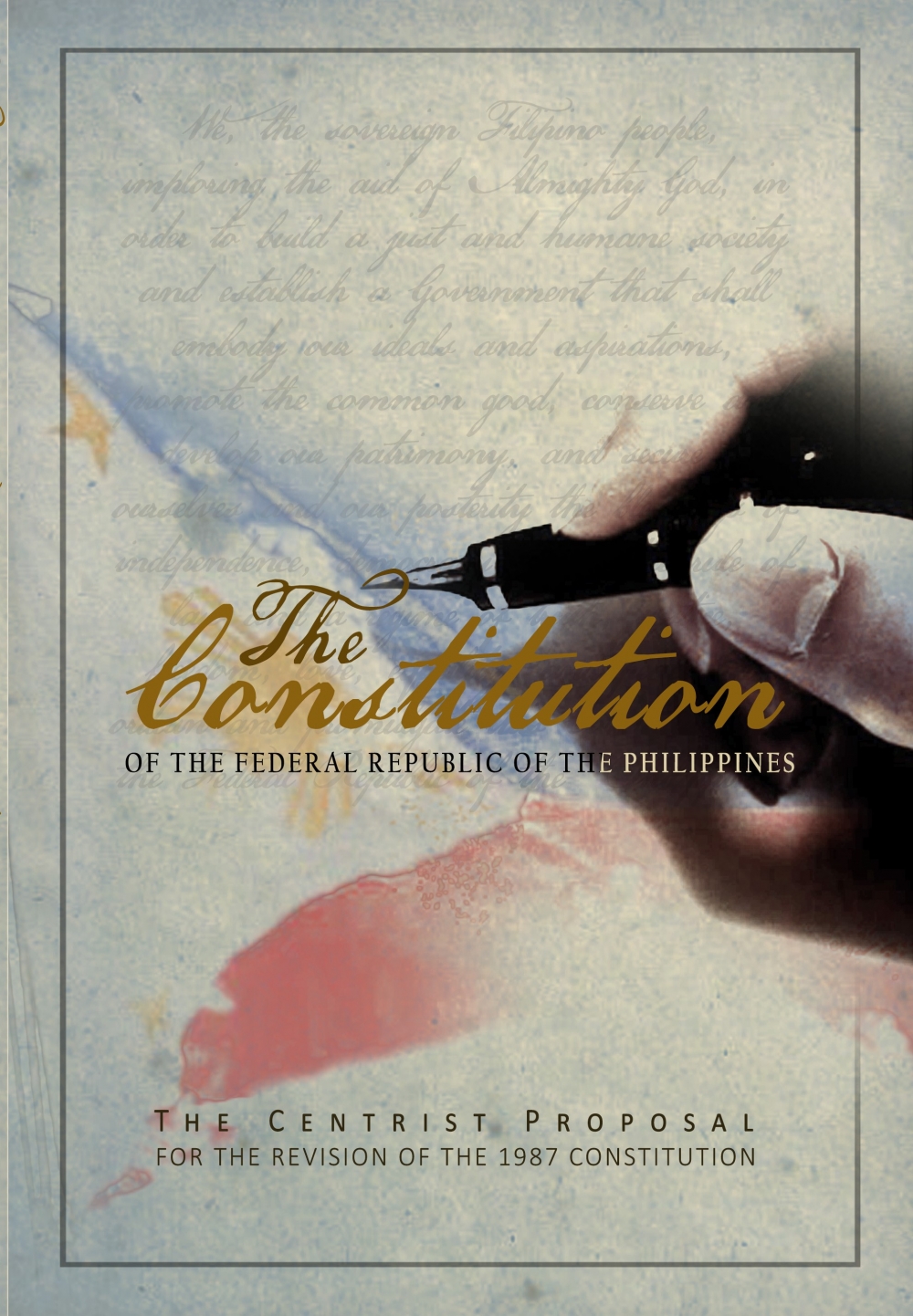
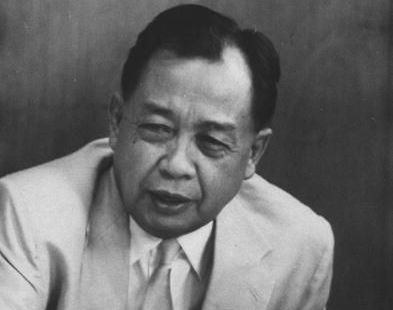
 I believe: This is a CoRRECT™ Video with a very positive message
I believe: This is a CoRRECT™ Video with a very positive message Walang Natira: Gloc-9's MTV Rap about the OFW Phenomenon
Walang Natira: Gloc-9's MTV Rap about the OFW Phenomenon

